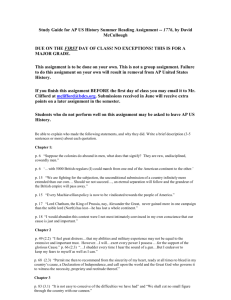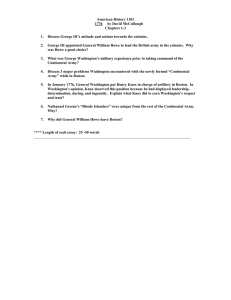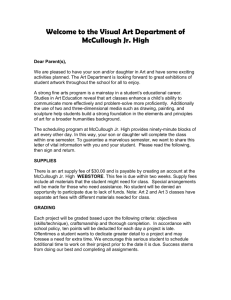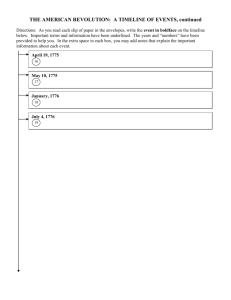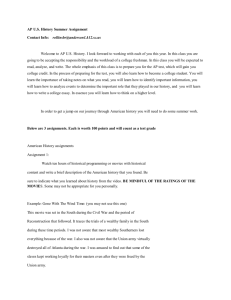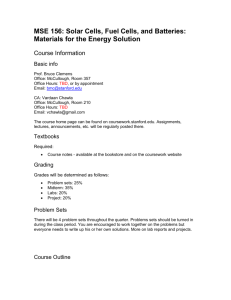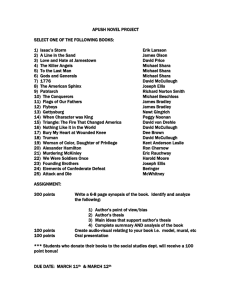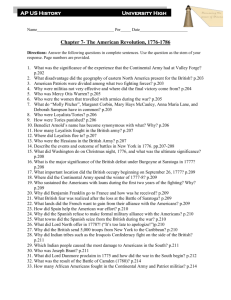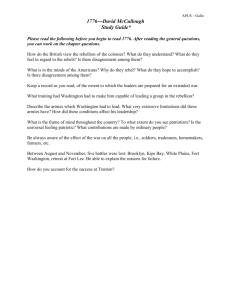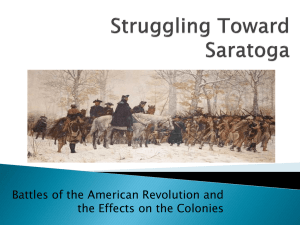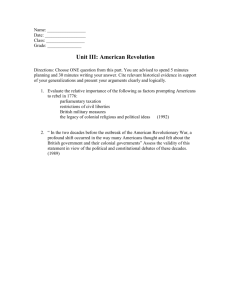Study Guide for Summer Reading Assignment -
advertisement
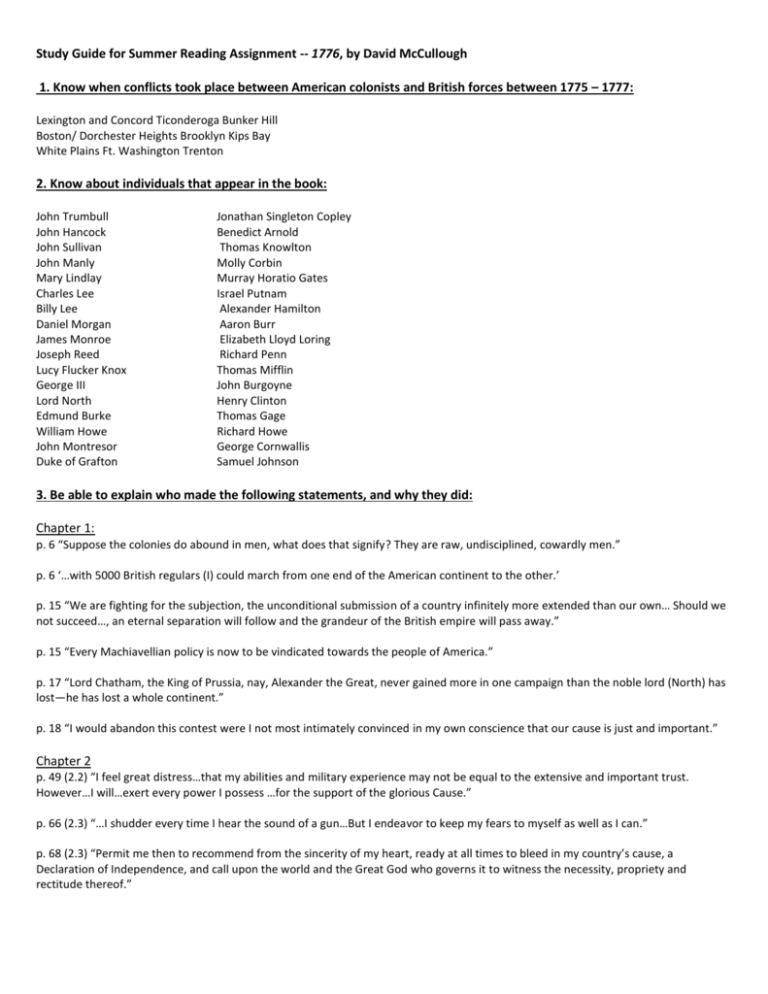
Study Guide for Summer Reading Assignment -- 1776, by David McCullough 1. Know when conflicts took place between American colonists and British forces between 1775 – 1777: Lexington and Concord Ticonderoga Bunker Hill Boston/ Dorchester Heights Brooklyn Kips Bay White Plains Ft. Washington Trenton 2. Know about individuals that appear in the book: John Trumbull John Hancock John Sullivan John Manly Mary Lindlay Charles Lee Billy Lee Daniel Morgan James Monroe Joseph Reed Lucy Flucker Knox George III Lord North Edmund Burke William Howe John Montresor Duke of Grafton Jonathan Singleton Copley Benedict Arnold Thomas Knowlton Molly Corbin Murray Horatio Gates Israel Putnam Alexander Hamilton Aaron Burr Elizabeth Lloyd Loring Richard Penn Thomas Mifflin John Burgoyne Henry Clinton Thomas Gage Richard Howe George Cornwallis Samuel Johnson 3. Be able to explain who made the following statements, and why they did: Chapter 1: p. 6 “Suppose the colonies do abound in men, what does that signify? They are raw, undisciplined, cowardly men.” p. 6 ‘…with 5000 British regulars (I) could march from one end of the American continent to the other.’ p. 15 “We are fighting for the subjection, the unconditional submission of a country infinitely more extended than our own… Should we not succeed…, an eternal separation will follow and the grandeur of the British empire will pass away.” p. 15 “Every Machiavellian policy is now to be vindicated towards the people of America.” p. 17 “Lord Chatham, the King of Prussia, nay, Alexander the Great, never gained more in one campaign than the noble lord (North) has lost—he has lost a whole continent.” p. 18 “I would abandon this contest were I not most intimately convinced in my own conscience that our cause is just and important.” Chapter 2 p. 49 (2.2) “I feel great distress…that my abilities and military experience may not be equal to the extensive and important trust. However…I will…exert every power I possess …for the support of the glorious Cause.” p. 66 (2.3) “…I shudder every time I hear the sound of a gun…But I endeavor to keep my fears to myself as well as I can.” p. 68 (2.3) “Permit me then to recommend from the sincerity of my heart, ready at all times to bleed in my country’s cause, a Declaration of Independence, and call upon the world and the Great God who governs it to witness the necessity, propriety and rectitude thereof.” Chapter 3 p. 83 (3.1) “It is not easy to conceive of the difficulties we have had” and “We shall cut no small figure through the country with our cannon.” p. 90 (3.2) “Proceed, great chief, with virtue on thy side/ Thy every action let the goddess guide.” p. 105 (3.3) “Surely it is the Lord’s doings and it is marvelous in our eyes!” p. 109 (3.3) “…the fact remains that the army which was sent to reduce the province of Massachusetts Bay has been driven (out) and that the standard of the provincial army now waves in triumph over the walls of Boston.” Chapters 4-7 p. 145 (4.3) “Those who have committed no fault want no pardon. We are only defending what we deem our indisputable rights.” p. 224 (6.2) “I only regret that I have but one life to lose for my country.” p. 251 (7.1) “These are times that try men’s souls. The summer soldier and the sunshine patriot will, in this crisis, shrink from the service of their country; but he that stands it now, deserves the love and thanks of man and woman.” p. 267 (7.2) Sir William, he, snug as a flee, Lay all this time a snoring; Nor dreamed of harm, as he lay warm In bed with Mrs. Loring p. 280 (7.3) “The storm continued with great violence, but was in our backs, and consequently in the faces of the enemy.” p. 286 (7.3) “…I shall constantly bear in mind that as the sword was the last resort for the preservation of our liberties, so it ought to be the first thing laid aside when those liberties are firmly established.” p. 291 (7.3) “ (there were perhaps)…no people on earth in whom a spirit of enthusiastic zeal is so readily kindled, and burns so remarkably, as among Americans.” PREPARE FOR CLASSROOM DISCUSSION Source: Madison Public Library 1. Why do you think that McCullough chooses to begin 1776 with King George III of England? How does this set the tone for the historical events about to unfold? 2. Describe the differences between the British and Colonial armies. Did the untrained, impromptu existence of the Colonial army give it any advantages over the British? What kind of insight into the military experience did the wealth of letters and other first hand sources McCullough provide? 3. One of the key figures in McCullough’s account is General George Washington. Did 1776 change your perspective on Washington? How would you describe Washington’s character? Do you think that Washington was a good leader? Do you think that there was anything particular about Washington that enabled him to turn a losing battle into a victory? 4. What kind of men were Nathanael Green and Henry Knox? What was their role in the success of the military? Why do you think Washington selected out these two untrained men above others and despite his distaste for New Englanders? 5. Did any of the events during the year of 1776 surprise you? Has reading about the military’s experience altered your view of the events that were simultaneously taking place in Philadelphia? How do you think the soldiers later felt about the 4th of July as a holiday, knowing that they did not receive news of the Declaration of Independence until well after the 4th? 6. How did you find the pace of the book? Did McCullough’s method of having events unfold make you feel you were living in 1776?
